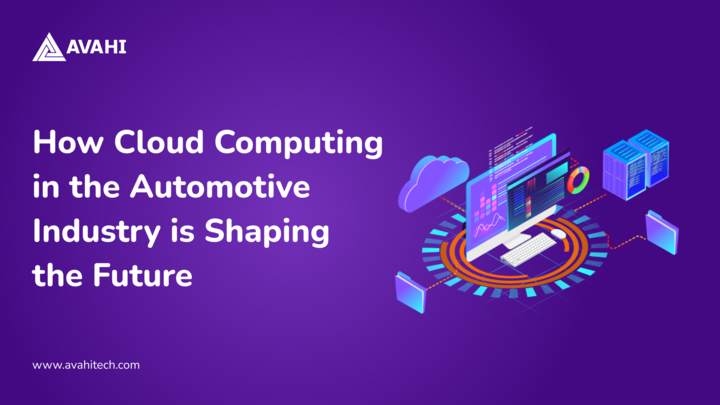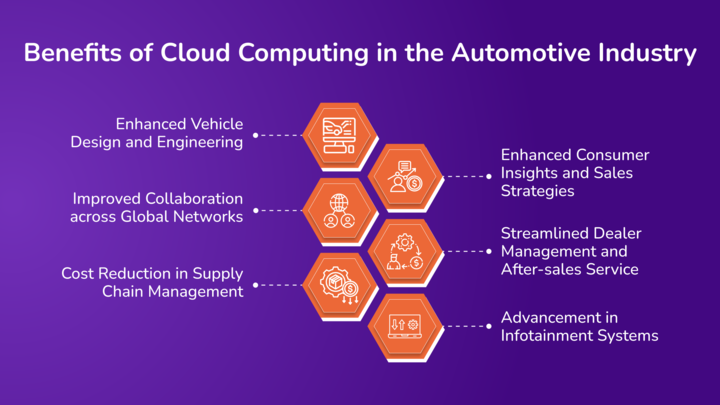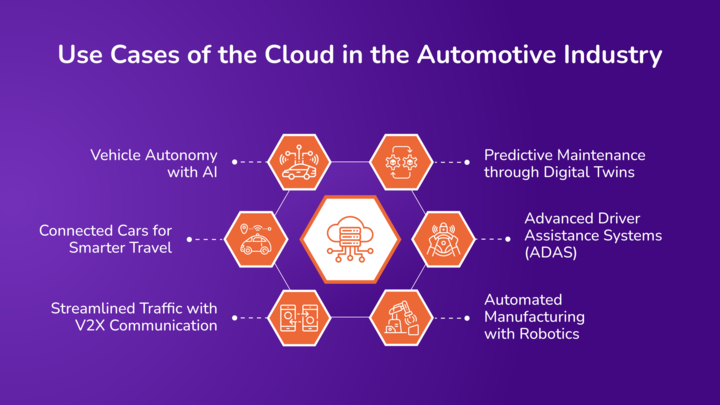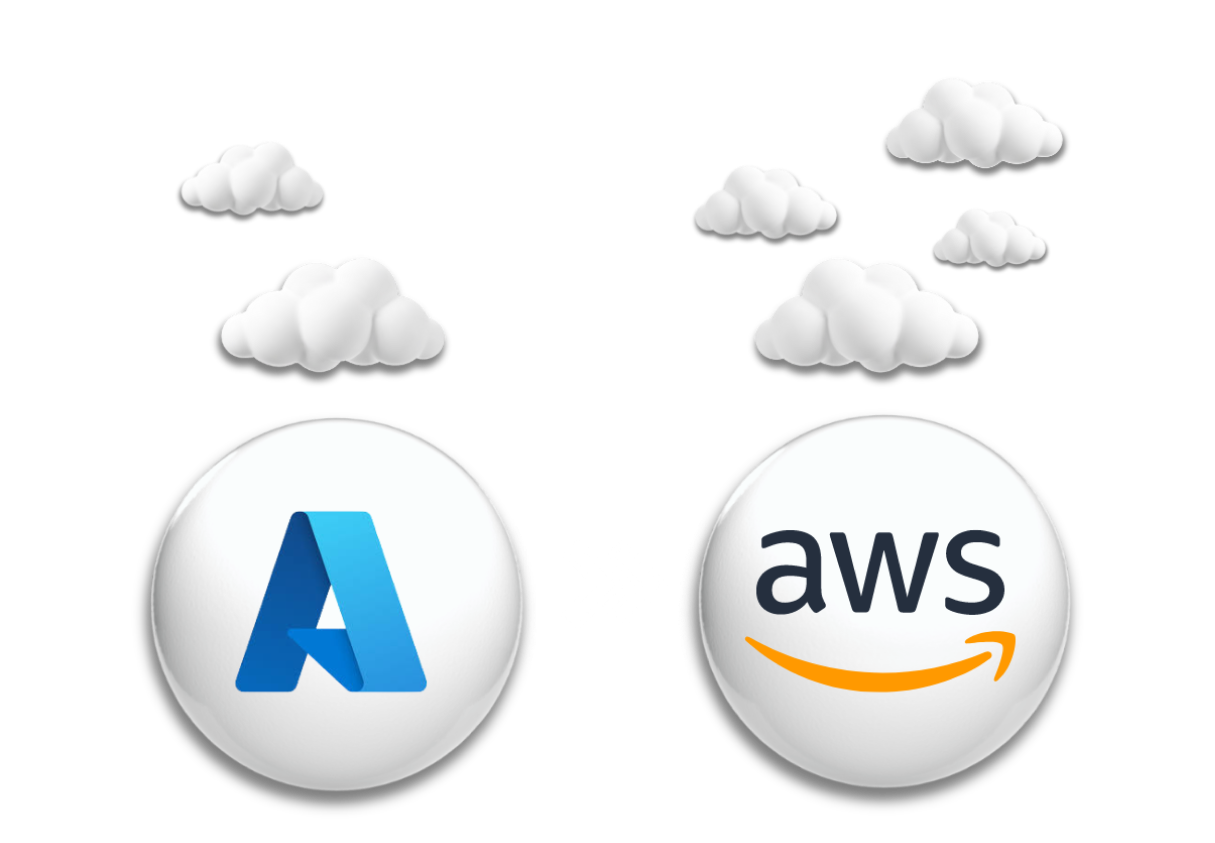The automotive industry is changing significantly, influenced by four main trends: autonomous driving, connectivity, electrification, and shared mobility. These developments are altering how cars are made and operated and increasing the demand for cloud computing to manage the large amounts of data they produce.
Previously, making cars was mostly about mechanical engineering and design. But over the past twenty years, technology has played a bigger role. Nowadays, automakers have to think about software just as much as hardware. The reason? Cars are becoming more connected and smarter, especially with the push towards fully autonomous vehicles. They must handle and process much information, especially as they drive themselves.
For example, while a regular car might produce about 25 gigabytes of data every hour, a self-driving car can generate over 2500 gigabytes simultaneously. That’s a lot of data, and it’s more than earlier systems can handle.
Cloud computing helps manage all this data. It uses large networks of servers housed in data centers worldwide to store and analyze data quickly and safely. This is crucial for ensuring that self-driving cars and other high-tech features work properly, keeping up with everything from traffic patterns to software updates without impacting the car’s system.
This blog will explore the use cases and benefits of cloud computing in the automotive industry, exploring how it’s currently used and what the future may hold.
Understanding Cloud Computing in the Automotive Industry
Cloud computing in the automotive industry refers to using remote servers hosted on the internet to store, manage, and process data for automotive applications.
This technology supports various functions, from enhancing vehicle connectivity and managing large volumes of data generated by modern cars, particularly autonomous and connected vehicles, to improving manufacturing processes and customer service.
Benefits of Cloud Computing in the Automotive Industry
Cloud computing is transforming the automotive industry by enhancing vehicle technology, improving collaboration, and increasing efficiency across various sectors. Here are some significant benefits of using cloud technology in the automotive field:
Enhanced Vehicle Design and Engineering
Cloud computing allows automotive engineers to use advanced analytics to better understand customer preferences and market trends, leading to more efficient and innovative vehicle designs.
For example, cloud technologies enable the reduction of physical hardware, creating more cabin space and allowing the integration of features like heated seats and smart windshields. A practical application is seen in electric vehicles, where cloud-assisted designs have helped optimize battery placement and performance, leading to more spacious interiors.
Improved Collaboration across Global Networks
The automotive industry operates globally, with complex supplier networks. Cloud computing brings these disparate parts closer, facilitating faster and more efficient collaboration.
For instance, a cloud platform enables seamless data sharing and real-time communication between manufacturers and suppliers worldwide, speeding up the development process and enhancing supply chain management.
Cost Reduction in Supply Chain Management
Cloud technology helps automotive companies manage inventory more effectively, from planning and forecasting to replenishment and transport scheduling. This scalability ensures companies can quickly adjust to market changes without excessive costs. Major automotive manufacturers use cloud systems to manage parts inventory and distribution dynamically, reducing overhead costs and improving response times during production peaks.
Enhanced Consumer Insights and Sales Strategies
Cloud computing allows automotive businesses to gather and analyze vast consumer data from various sources, including social media, sales records, and online configurations. This wealth of information leads to more informed sales strategies and higher customer retention rates. For example, using cloud-based CRM systems, dealers can tailor their offerings to individual customer preferences, which has been shown to increase sales and customer loyalty.
Streamlined Dealer Management and After-sales Service
The cloud supports advanced dealer management systems, which help automate servicing schedules and manage orders more efficiently. It also aids in consistent brand representation across numerous dealerships. For instance, automotive companies have employed cloud systems to integrate customer service and feedback into their service networks, ensuring that customer needs are promptly met and improving overall customer satisfaction.
McKinsey highlights the financial impact of such digital strategies, reporting that revenue generated from recurring services and digital enhancements could boost original equipment manufacturer (OEM) revenues by up to 30% over the next decade.
Advancement in Infotainment Systems
Cloud technology enables the integration of sophisticated infotainment systems in vehicles, which provide drivers with real-time information on fuel consumption, navigation, and service alerts.
These systems can also support vehicle-to-vehicle communication and other mobility-related services. For example, manufacturers like BMW use cloud-based platforms to continuously update and improve the features available in their vehicles’ infotainment systems, ensuring that consumers always have access to the latest technology.
Choosing the Right Cloud Solution for Automotive Innovation
Here is an explanation of the types of cloud computing environments and illustrates how each can be applied effectively in the automotive industry to drive innovation and efficiency.
| Cloud Type | Description | Use Cases in Automotive | Benefits |
| Private Cloud | A cloud setup where resources are exclusively used by one organization. It offers more control and security. | Used for storing sensitive data like proprietary designs and customer information. | Enhances security and control, protecting intellectual property and sensitive information. Example: A luxury car manufacturer managing its design and engineering securely. |
| Public Cloud | A cloud service provided by third-party vendors that’s shared across multiple organizations. | Ideal for scalable needs like hosting customer-facing applications (e.g., car configurators) | Provides flexibility and accessibility, making it cost-effective for scaling up resources as needed. |
| Hybrid Cloud | Combines private and public clouds, sharing data and applications between them. | Secure storage of sensitive data (private cloud) while using public cloud for less sensitive tasks like collaboration across the supply chain. | Balances security with flexibility; improves communication and project management within the automotive industry. |
| Multi-Cloud | Uses multiple cloud services from different providers to avoid reliance on a single vendor. | Allows automakers to use the best services from different providers for specific tasks. | It avoids vendor lock-in, optimizes costs, and accesses specialized services tailored to different needs. |
Use Cases of the Cloud in the Automotive Industry
Here are six use cases where cloud technology significantly impacts the automotive industry:
Vehicle Autonomy with AI
Cloud computing provides the essential computational power for developing autonomous vehicles. This includes processing vast amounts of data to train machine learning models that enable cars to process complex environments. For example, Volkswagen has teamed up with AWS to create a specialized cloud platform supporting the development of autonomous driving technologies.
Connected Cars for Smarter Travel
Through cloud technology, connected vehicles can access real-time traffic updates, perform remote diagnostics, and receive automatic software updates. This continuous data flow improves the driving experience by keeping the car updated and in tune with its surroundings.
Streamlined Traffic with V2X Communication
VCloud platforms facilitate vehicle-to-everything (V2X) communication, which allows vehicles to interact in real-time with the road infrastructure. This integration helps manage traffic more efficiently, reduce congestion, and enhance road safety.
Predictive Maintenance through Digital Twins
Cloud-supported digital twins—virtual replicas of physical vehicles—enable real-time monitoring and predictive maintenance. This technology predicts potential issues before they occur, reducing downtime and maintenance costs.
Advanced Driver Assistance Systems (ADAS)
Cloud connectivity enhances ADAS by processing data from various sources in real time. This improves safety features like predictive collision avoidance and adaptive cruise control, making driving safer.
Automated Manufacturing with Robotics
Cloud solutions boost the use of robotics in automotive manufacturing, increasing the precision and efficiency of processes like assembly and logistics. This improves production speed and ensures higher quality and safety standards.
These use cases demonstrate how cloud computing is not just a supportive technology but a transformative force in making vehicles and their production smarter, safer, and more efficient.
Examples of Cloud Computing in the Automotive Industry
Here are three case studies that illustrate how cloud computing has been effectively used in the automotive industry:
Volkswagen and Amazon Web Services (AWS) Collaboration
Volkswagen partnered with AWS to develop the Volkswagen Industrial Cloud. This cloud system integrates data from all machinery, plants, and systems across Volkswagen’s 122 manufacturing plants. Its purpose is to improve manufacturing efficiency and vehicle quality. By using cloud computing, Volkswagen can analyze data from different sources in real time, optimize operations, and predict maintenance needs, thus reducing downtime and increasing productivity.
General Motors and Google Cloud Partnership
General Motors utilizes Google Cloud’s capabilities to implement ‘Vehicle Intelligence Platforms.’ This technology enhances the functionality of connected cars, improving navigation and offering real-time diagnostics and predictive maintenance. The cloud platform enables GM to continuously update vehicle software remotely, ensuring drivers can access the latest features and security updates without needing to visit a dealership.
Toyota’s Use of Microsoft Azure
Toyota has implemented Microsoft Azure to create a global communication platform that connects its vehicles worldwide. This platform supports Toyota’s telematics service, which offers drivers services such as emergency assistance and GPS navigation. Cloud computing allows Toyota to collect vast amounts of data from vehicles, analyze this data for insights, and use these insights to improve customer service and vehicle safety features.
The Future of Cloud Computing in the Automotive Industry
Cloud computing is poised to significantly reshape the automotive industry, offering new opportunities and efficiencies. Here’s what the future looks like:
- The value of connected car technologies could skyrocket from about $64 billion in 2020 to more than $550 billion by 2030.
- Cloud computing can shift car maintenance from fixed schedules to predictive maintenance, reducing inefficiencies in service, parts ordering, and inventory.
- The rollout of advanced connected-car features depends on the expansion of 5G and edge computing. By 2030, these technologies will enable about 30% of the industry’s value.
- Automotive players and new entrants, including software developers and semiconductor manufacturers, are expected to drive innovation and create more integrated automotive solutions.
- Cloud computing allows for greater customization and efficiency in manufacturing and maintenance, aligning closely with consumer demands and market trends.
The integration of cloud computing within the automotive industry suggests a promising horizon enriched with technological advancements, smarter vehicle management, and substantial economic growth.
Explore Advanced Cloud Solutions with Avahi
Avahi specializes in delivering innovative cloud solutions that address your unique business challenges. As your dedicated AWS Cloud Consulting Partner, we are committed to simplifying your cloud journey through seamless adoption, migration, and application modernization.
Our Services Include:
- Adoption and Migration: Migrate your legacy applications or workloads to AWS for enhanced reliability, scalability, and performance.
- DevOps: Unlock the power of your data with advanced analytics and machine learning capabilities.
- Cloud Staffing Services: Access top-tier talent to support and drive your initiatives, ensuring a seamless and effective cloud transformation.
Want to explore how Avahi can help you simplify, modernize, and excel in your cloud journey.






